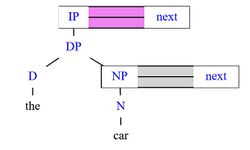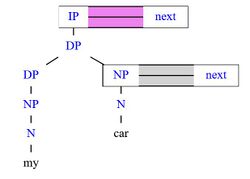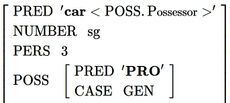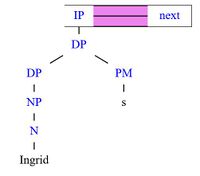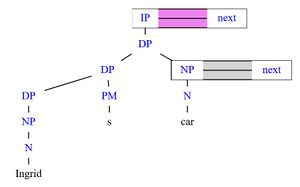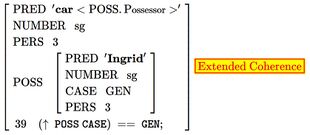Practical Grammar 11: Difference between revisions
Jump to navigation
Jump to search
No edit summary |
No edit summary |
||
| (3 intermediate revisions by the same user not shown) | |||
| Line 1: | Line 1: | ||
== Determiner Phrases with possessives == | |||
=== Exercise === | |||
In this exercise, you are supposed to add to the grammar (if necessary) the lexical entries and rules to license the following strings: | |||
(1) the car<br> | |||
(2) my car<br> | |||
(3) Ingrid s<br> | |||
(4) Ingrid s car<br> | |||
<!-- | |||
(3) my new car<br> | |||
(4) my shiny new car<br> | |||
(5) *Ingrid car<br> | |||
(6) Ingrid s car<br> | |||
(7) I like my shiny new car<br> | |||
(8) I like Ingrid s shiny new car<br> | |||
(9) I like my brother s shiny new car<br> | |||
(10) I like Ingrid s brother s shiny new car | |||
--> | |||
Your grammar should output the following representations: | |||
(1) '''the car'''<br> | |||
[[ File: | [[File:The-car-csJPG.JPG|250px]] | ||
[[File:The-car-fs.JPG|120px]] | |||
[[File:The-car.as.JPG|90px]] | |||
(2) '''my car'''<br> | |||
[[File:My-car-cs.JPG|250px]] | |||
[[File:My-car-fs.JPG|230px]] | |||
[[File:My-car-as.JPG|250px]] | |||
( | (3) '''Ingrid s'''<br> | ||
[[File:Ingrid-s-cs.JPG|200px]] | |||
[[ File: | [[File:Ingrid-s-fs.JPG|240px]] | ||
[[File:Ingrid-s-as.JPG|120px]] | |||
(4) '''Ingrid s car'''<br> | |||
[[File:Ingrid-s-car-cs.JPG|300px]] | |||
[[File:Ingrid-s-car-fs.JPG|310px]] | |||
[[File:Ingrid-s-car-as.JPG|250px]] | |||
<br> | <br> | ||
| Line 65: | Line 62: | ||
<font size="2"> | <font size="2"> | ||
<div align="center"> | <div align="center"> | ||
[[Practical_Grammar |'''Main page''']] [[Practical_Grammar_2|'''Week 2''']] [[Practical_Grammar_3|'''Week 3''']] [[Practical_Grammar_4|'''Week 4''']] [[Practical_Grammar_5|'''Week 5''']] [[Practical_Grammar_6|'''Week 6''']] [[Practical_Grammar_7_new|'''Week 7''']] [[Practical_Grammar_8|'''Week 8''']] [[Practical_Grammar_9|'''Week 9''']] | [[Practical_Grammar |'''Main page''']] [[Practical_Grammar_2|'''Week 2''']] [[Practical_Grammar_3|'''Week 3''']] [[Practical_Grammar_4|'''Week 4''']] [[Practical_Grammar_5|'''Week 5''']] [[Practical_Grammar_6|'''Week 6''']] [[Practical_Grammar_7_new|'''Week 7''']] [[Practical_Grammar_8|'''Week 8''']] [[Practical_Grammar_9|'''Week 9''']] [[Practical_Grammar_10|'''Week 10''']] | ||
</div> | </div> | ||
<div align="center"> | <div align="center"> | ||
'''Week 11''' | |||
</div> | </div> | ||
<!-- [[Practical_Grammar_12|'''Term Paper Project''']] --> | |||
Latest revision as of 09:25, 9 June 2023
Determiner Phrases with possessives
Exercise
In this exercise, you are supposed to add to the grammar (if necessary) the lexical entries and rules to license the following strings:
(1) the car
(2) my car
(3) Ingrid s
(4) Ingrid s car
Your grammar should output the following representations:
(1) the car
(2) my car
(3) Ingrid s
(4) Ingrid s car
Week 11
